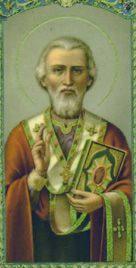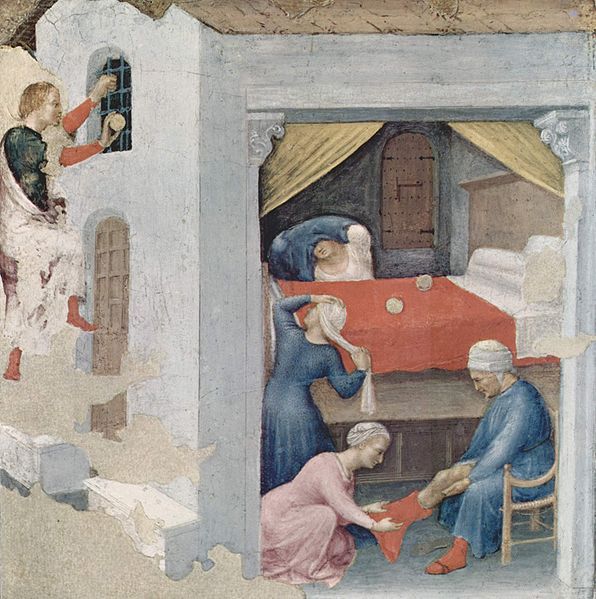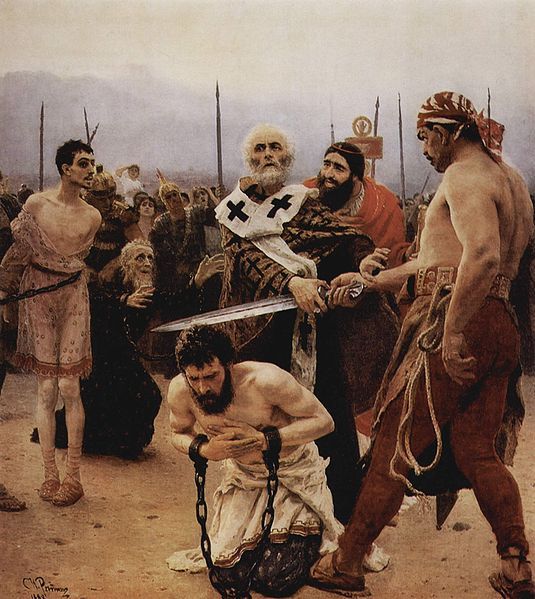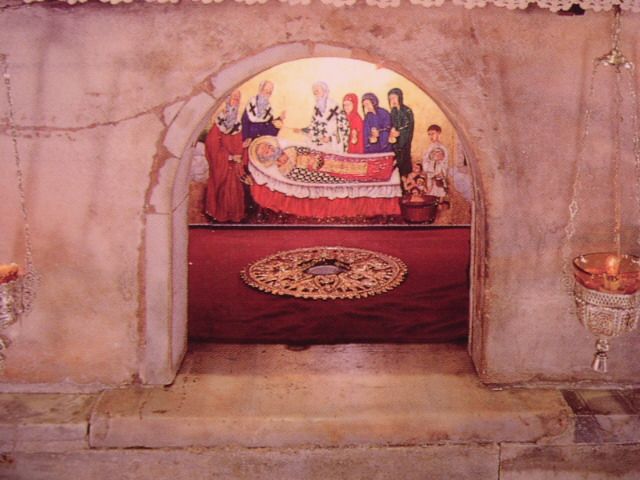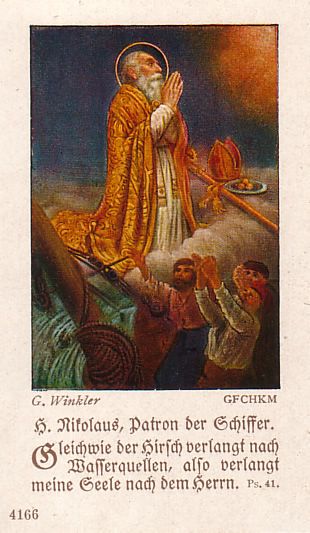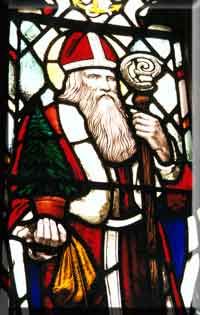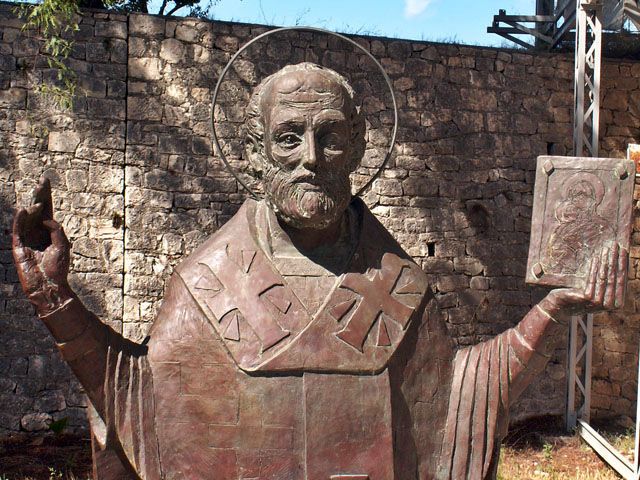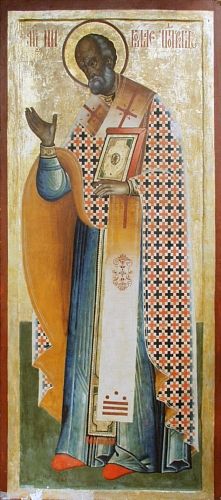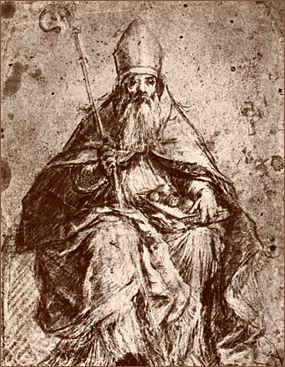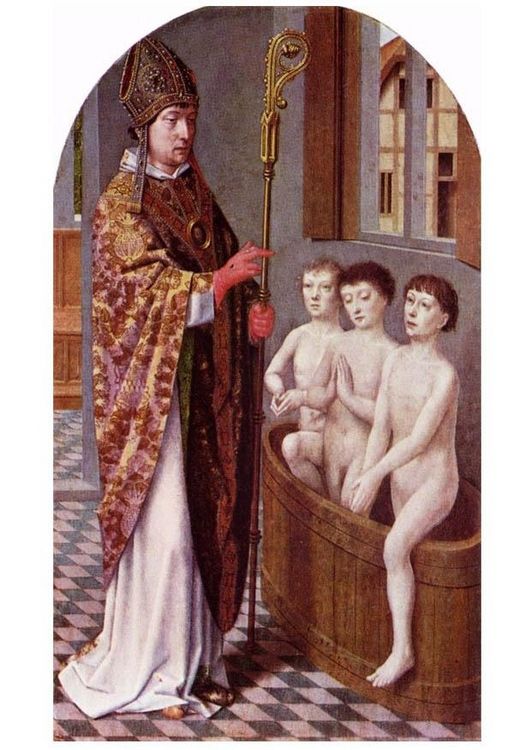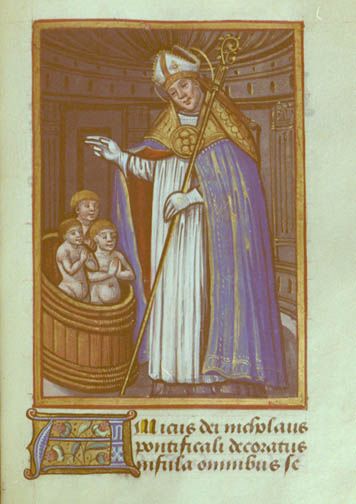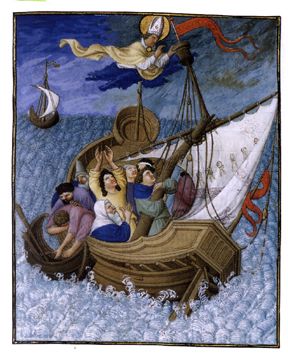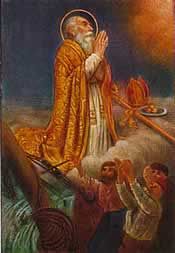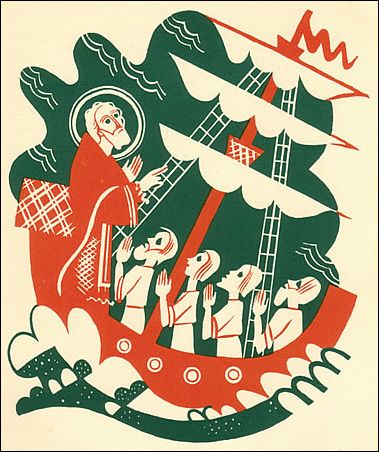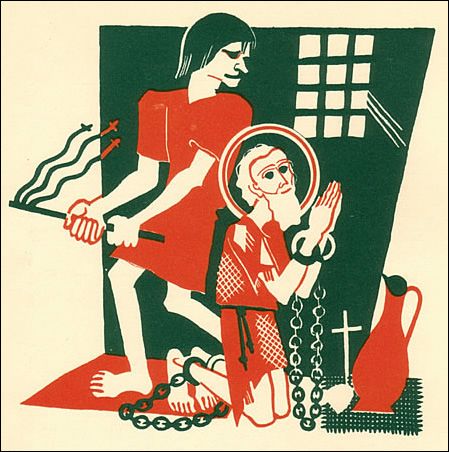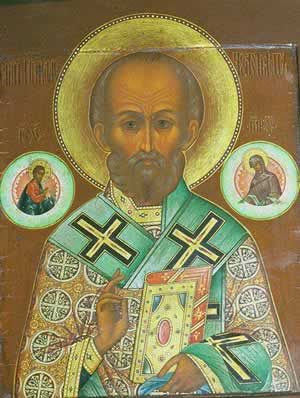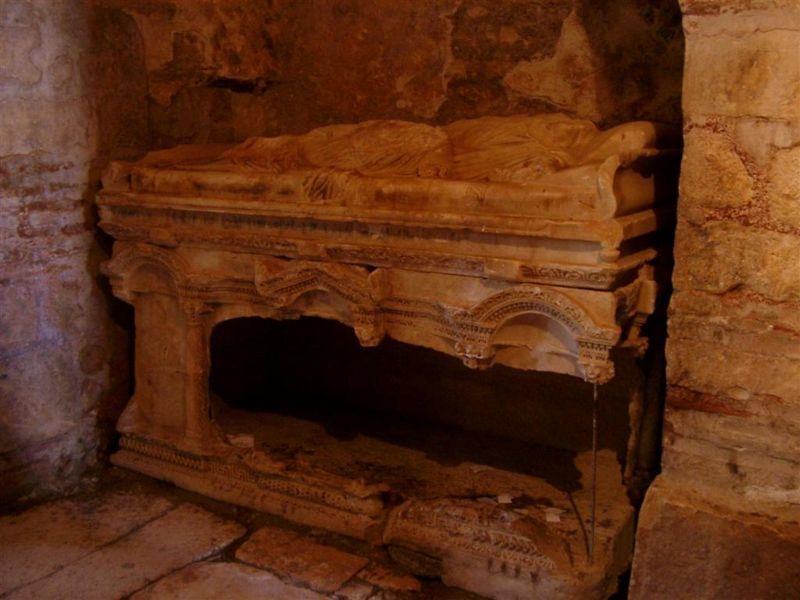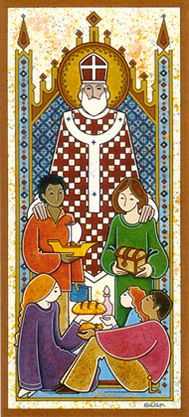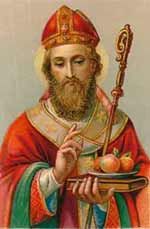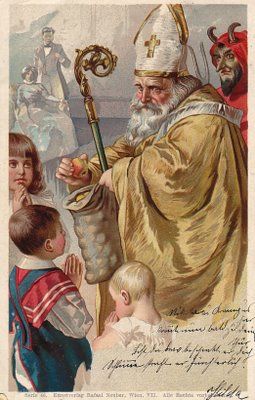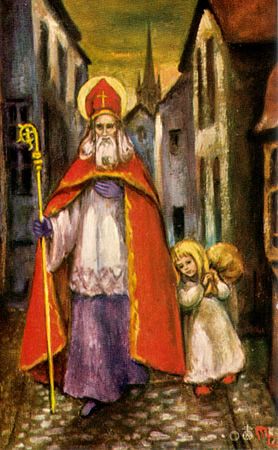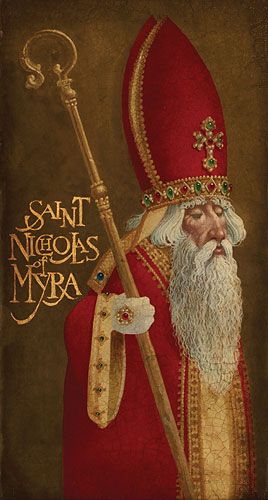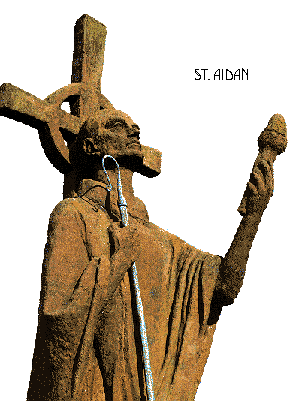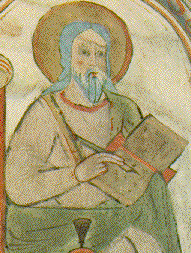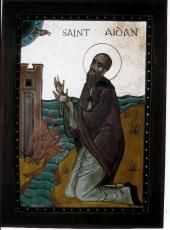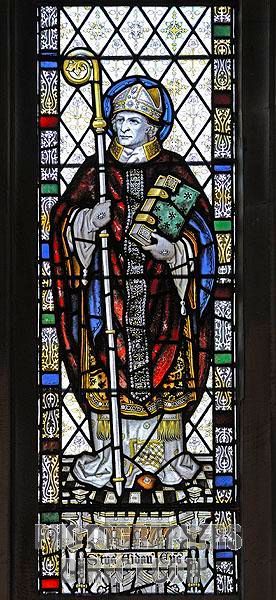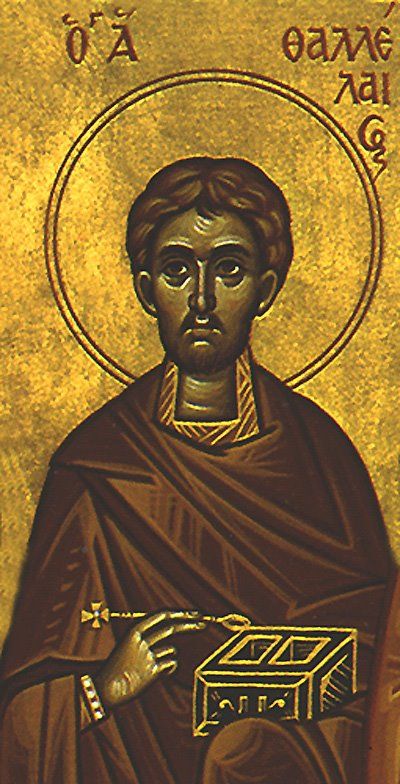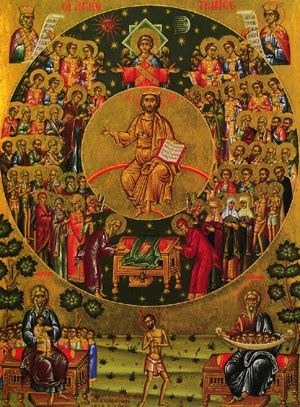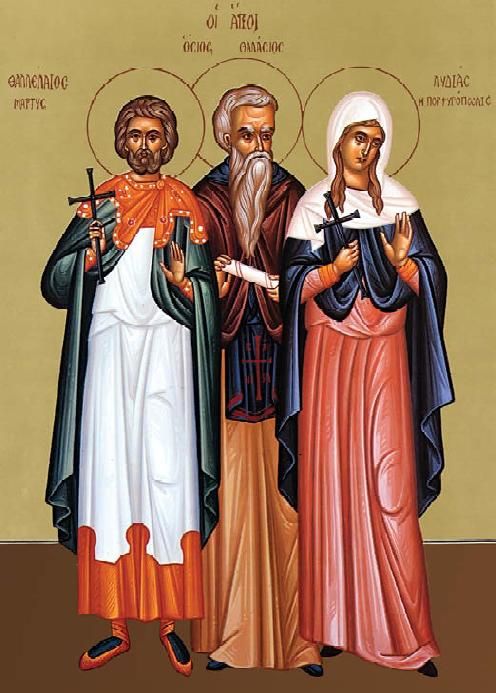O blessed Saint, we honor you,
On this great festal day.
Hail Nicholas the faithful say,
Apostle of the Way.
As you helped those who round you came;
May we your presence feel,
As our commitment is the same
Answering Love's appeal.
The father poor, the three young girls,
Young men to life restored.
Sailors can rest, the sea is blessed,
Your miracles record.
In prison dark, your faith was strong;
Help those who suffer wrong,
We heed your words, the gospel call,
To hail Christ, Lord of all.
As Bari's pilgrims make their way
To sing of your great name,
The wonder myrrh of Myra still
Proclaims your loving fame.
Lead us dear saint, in joy and peace,
Your prayers we now implore,
As we praise God, the Father, Son
And Spirit blest adored.
Today, December 6, we celebrate the feast day of
Saint Nicholas, Bishop of Myra (died 346), the inspiration for many of our current secular Christmas traditions. This great saint is the most frequently depicted saint in art (only Our Blessed Mother surpasses him), and the veneration and honor he is given throughout the world are testimonials to his holiness and of the glory which he enjoys with God.
Little is known about the life of Saint Nicholas. That which is most reliable comes from a monk, Saint Methodius, Patriarch of Constantinople, who wrote a biography of Saint Nicholas approximately 500 years after his death. In his “life,” Saint Methodius tells us that that "
Up to the present the life of this distinguished Shepard has been unknown to the majority of the faithful." He then describes the extraordinary events of the life of Saint Nicholas. The truth of many of these legends is unknown, but each speaks to a man of great faith.
From this and other works, we know with certainty that when the See of Myra lost it’s bishop, Nicholas was chosen to fill the vacancy. There, he was recognized for his extraordinary piety, apostolic zeal, and became famous for working astonishing miracles.
Nicholas was born at Patara in Lycia (Asia Minor), and demonstrated great piety and faith from an early age. For example, we are told that he fasted on Wednesdays and Fridays, taking only nourishment in the evenings. Per his biography, "He was exceedingly well brought up by his parents and trod piously in their footsteps. The child, watched over by the church enlightened his mind and encouraged his thirst for sincere and true religion".

Sadly, Nicholas’ parents died when he was still young, and taking his considerable inheritance, devoted himself to works of charity. One of his most “famous” charitable acts is thought to have inspired the giving of Christmas gifts: A citizen of Patara, where he lived, had lost all of his money. This honorable man had three daughters to support, and could not find suitable husbands because of their poverty. Upon hearing of this situation, Nicholas took a bag of gold, and in the night, threw the bag in the open window of the man’s house. (Some say that the gold—also sometimes referred to as gold balls, rather than bags, landed in the socks and shoes of the family, drying before the fire. This led to the tradition of hanging stockings to be filled.) The man, using the money as dowry, promptly found a suitable suitor for his eldest daughter, who was married. Nicholas repeated the act twice more, once for each remaining daughter. However, the man kept watch, and upon recognizing Nicholas, was overcome with gratitude and thanks. From this, we see Saint Nicholas as a holy man, charitable, and giving of himself to others.
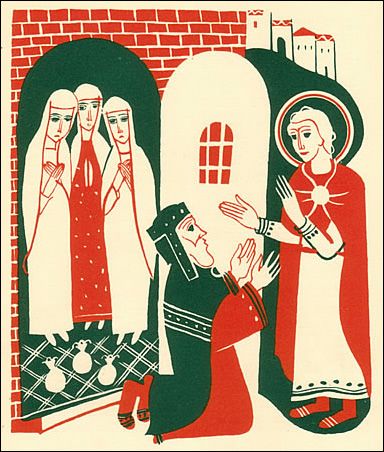
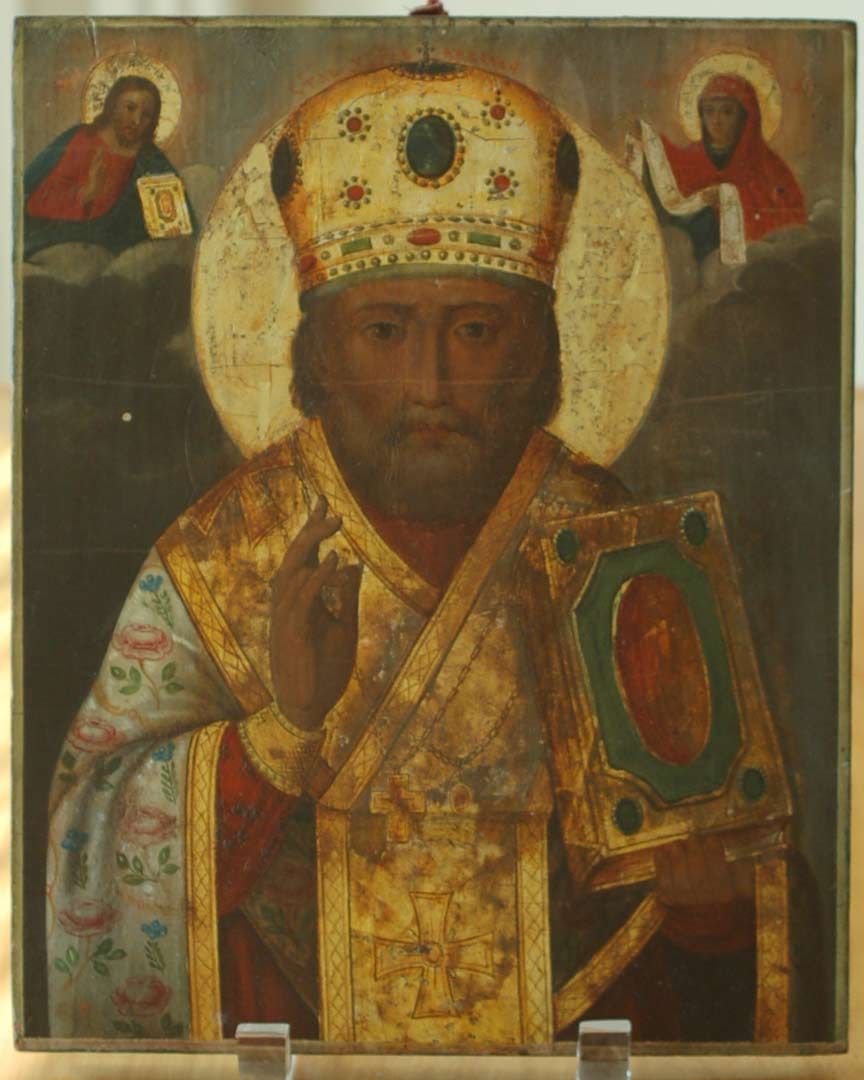
Nicholas soon departed Patara, traveling to the city of Myra where his uncle was the Archbishop. There, he was ordained, and appointed the Superior of a monastery. Upon the death of his uncle, Nicholas was appointed the new bishop by the people, who were certain that he had been chosen by the Lord. Around that time, the Diocletian persecutions of Christians were beginning, and
"As he was the chief priest of the Christians of this town and preached the truths of faith with a holy liberty, the divine Nicholas was seized by the magistrates, tortured, then chained and thrown into prison with many other Christians. But when the great and religious Constantine, chosen by God assumed the imperial diadem of the Romans, the prisoners were released from their bonds and with them the illustrious Nicholas, who when he was set at liberty returned to Myra."
Saint Nicholas protected his flock against the heresies common in that time. He was likely present at the Council of Nicaea, where some legend tells of him striking Arius (the originator of the Arian heresy) and being imprisoned, only to be freed by visions of Jesus and Mary. Saint Nicholas also fought valiantly against paganism, destroying pagan temples throughout the region with “evil spirits fleeing, howling before him.”

But Saint Nicholas did not limit himself to the spiritual affairs of his people. He served as protector and guardian, advocating for prisoners, and famously freeing three innocent men wrongly condemned to death by the governor, Eustathius. Upon freeing the men, Nicholas incessantly reproached the governor—in front of a large crowd—until he admitted his wrong-doing and became sincerely penitent. Saint Nicholas later miraculously freed three men from a distance, appearing to Emperor Constantine and demanding their release in a dream. The next morning, when the imprisoned men called upon the name of Saint Nicholas for intercession, the emperor freed them, sending them back to the great saint with a letter asking for no more threats, but for peace in the world. For this, Saint Nicholas is regarded as the patron of prisoners and captives.

Additional miracles reported at the intercession of Saint Nicholas include the raising to life three young boys who were killed and hidden in pickling barrels to avoid detection (For this, he is the patron and protector of children), and the calming of stormy seas by his word upon voyages to the Holy Land. It is this latter miracle—during which he appeared to frightened sailors off the coast of Lycea, that led his patronage of sailors. Sailors in the Aegean and Ionian seas, following a common Eastern custom, had their "star of Saint Nicholas" and wished one another a good voyage in the phrase
"May Saint Nicholas hold the tiller.”
Under the rule of Emperor Diocletian, Nicholas was imprisoned for his faith, but refused to recant, and was eventually freed upon the death of the Emperor. He is recorded as makinga "glorious confession" of the faith to his jailors, converting many.
Saint Nicholas died at Myra, and is buried there in the basilica named for him. At Myra
"the venerable body of the bishop, embalmed as it was in the good ointments of virtue exuded a sweet smelling myrrh, which kept it from corruption and proved a health giving remedy against sickness to the glory of him who had glorified Jesus Christ, our true God." During the Saracen occupation, the relics of Saint Nicholas were translated to Bari, Italy. The translation of the relics did not interrupt this phenomenon, and the "manna of St. Nicholas" is said to flow to this day. This “manna”-- a unique relic which forms in his grave, is a liquid substance said to have healing powers. It was one of the great attractions which draws pilgrims to his tomb from all parts of Europe.
An anonymous Greek wrote in the tenth century that,
"the West as well as the East acclaims and glorifies him. Wherever there are people, in the country and the town, in the villages, in the isles, in the furthest parts of the earth, his name is revered and churches are built in his honor. Images of him are set up, panegyrics preached and festivals celebrated. All Christians, young and old, men and women, boys and girls, reverence his memory and call upon his protection. And his favors, which know no limit of time and continue from age to age, are poured out over all the earth; the Scythians know them, as do the Indians and the barbarians, the Africans as well as the Italians."

As a bishop, Saint Nicholas, was first and foremost a shepherd of the people, caring for their needs. His active pursuit of justice for his people was demonstrated when he secured grain in time of famine, saved the lives of three men wrongly condemned, and secured lower taxes for Myra. He taught the Gospel simply, so ordinary people understood, and he lived out his faith and devotion to God in helping the poor and all in need. Regardless of the accuracy of the legends and miracles reported in his name, the life and deeds of Saint Nicholas, and the attitude with which he praised the Lord, make him an inspiration to us today. As we move through Advent, toward Christmas, let us emulate Saint Nicholas in our care and concern for the welfare of others.
O God, Who didst adorn blessed Nicholas,
the bishop, with miracles unnumbered,
grant, we beseech Thee, that by his merits
and prayer we may be delivered from the
fire of hell. Through Christ our Lord. Amen.
Year 2: Day 340 of 365
Prayer Intentions: True Christian care and concern for others, especially those in need, marginalized, maligned, or suffering.
Requested Intentions: Financial security for a mother (M); Health, finances, successful marriage (A); Successful resolution of court case for son (K); Continued sobriety (N); Healing of a chronic health condition (B); Successful employment (A): Peace in a family, recovery of a niece from substance use (L); Blessings on a marriage, healing of a husband (P); For the health and recovery of sisters (B); For a daughter and granddaughter (D); Blessings on overseas employment (M); Healing of mother (L); Successful employment for husband (G); Successful employment, personal fulfillment (C); Health and recovery of ill sister (A); Resolution of legal issues; Grace and protection (E); Successful and meaningful employment (S); Restoration of a marriage (A); Peace and tolerance in a family, support for those with Parkinson’s Disease (M); For the restoration of a daughter’s marriage, end to debt (S); Employment and continued strength (K); Successful examinations for a son (J); Employment and blessings of a child (S); Employment and financial security (F); Successful work placement, continued health (A); Grace and healing for a family (P); Healing of a father (M).












